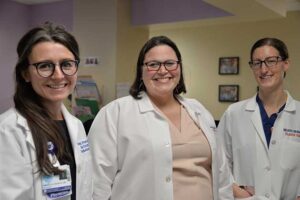Overview

Our Plastic Surgery Residency Program uses an integrated model to provide complete plastic surgery training, leading to application for examination by the American Board of Plastic Surgery.
Two positions are offered each year for the six-year training cycle. Sixteen months are dedicated to integrated core surgery training, tailored to provide graduated responsibility for patient care and technical expertise for a broad range of surgical disciplines.
Plastic surgery residents participate in all aspects of inpatient and outpatient care. Clinical volume is high, and residents are involved in all clinical activities including preoperative evaluation, surgery, postoperative care and follow-up. Plastic surgery residents are also responsible, under close supervision of the attending faculty, for the focused evaluation and treatment of serious and critically sick or injured patients. Residents work side by side with faculty members to provide exceptional care for patients and to ensure an excellent educational experience. We are committed to providing hands-on experience to our residents and operative responsibilities are awarded progressively as ability develops.
In addition to clinical activities, residents and faculty participate in didactic activities including a weekly educational seminar based on a three-year rotating curriculum, a monthly journal club, quality improvement and patient safety conference, research conference, and anatomic dissections in the anatomy lab. These are all structured educational activities with identified goals and objectives. We are extremely proud of our state-of-the-art Patient Safety and Clinical Competency Center, offering several activities aimed at improving clinical skills, including human patient simulators and our microsurgical lab.
Teaching
Residents gain valuable teaching experience through participation in the training of medical students, general surgery residents, and residents from other subspecialties who rotate on the plastic surgery service.
Didactic teaching is mostly by the tutorial method. Faculty members and assigned residents lead discussion periods each week according to a schedule which will cover the breadth of plastic surgery in three years. Faculty members present formal lectures on collaborative material. Visiting professors are welcomed approximately twice a year and provide individual exposure to leaders in the specialty. All residents spend time in the microsurgical laboratory for their education and technical practice.
Travel
Time and funding are provided for attendance at any national or regional meetings for which an abstract is accepted for presentation.
Lab and Simulation Training
Patient satisfaction has become an important benchmark of good quality health care. Physician-patient communication is a difficult skill to teach as there are fewer bedside resident-attending interactions to help model this behavior. To encourage these skills, our residents participate in patient simulations of both routine plastic surgical scenarios as well as difficult or hostile patient encounters. Here, they can practice communication skills and receive real-time feedback on their performance to better prepare them for real life experiences in a low stress environment. Individual scenarios are designed to focus on common consent issues, patient complications, difficult patient interactions, and surgical decision making that they are likely to face post-graduation. These sessions are performed in group as well as individual settings.
Basic Surgical Microsurgery Skills
Achieving competency in microsurgery is a fundamental skill required for all plastic surgery residency programs. Our simulation center provides structured modules utilizing an operating microscope to enhance microsurgical skills. We have developed a microsurgery training platform similar to the FLS training modules seen in general surgery, but in a scaled down version. Residents are instructed on the use and set up of an operating microscope, proper instrument handling, and efficiency of movement in instrument handling.
Our simulation center also provides an opportunity for our residents, who come from various medical school backgrounds and experiences, to learn about common surgical instruments and their correct use, needle positioning, and suturing and knot tying. They are also taught basic patient positioning, surgical preparation, and sterile technique.
Cadaver Program
Albany Medical College is fortunate to have a robust anatomical gift program. Cadaver dissection courses demonstrate routine procedures and basic anatomy, and offer residents hands-on practice with basic tendon repair and flap coverage. During visiting professor lectures, the cadavers are also available to demonstrate and reinforce procedures that are discussed.
Mentorship
The goal of our mentorship program is to empower junior surgical trainees with the self-awareness and support to develop the foundational study, management, and reflective skills to be inspired, insightful, and effective learners and leaders.
Through group meetings in a relaxed, informal environment, the mentorship program provides a framework for self-exploration to facilitate our junior plastic surgery trainees' personal growth and career development.
Resident outcomes include:
- Greater insight into wellness needs and support systems
- Foundation for developing effective study skills
- Conflict resolution strategies
- Insight into personal leadership style and tools to prepare for managing teams as a senior resident
- Understanding of different career options and opportunities and access to surgeons within the division to facilitate career exploration and development
Research
Throughout the program, plastic surgery residents are encouraged to pursue special interests in clinical and experimental topics related to plastic surgery. Opportunities are available for basic science research in the NIH-funded wound healing research lab. Additionally, two months of dedicated research time is built into the block schedule during the third year of residency.